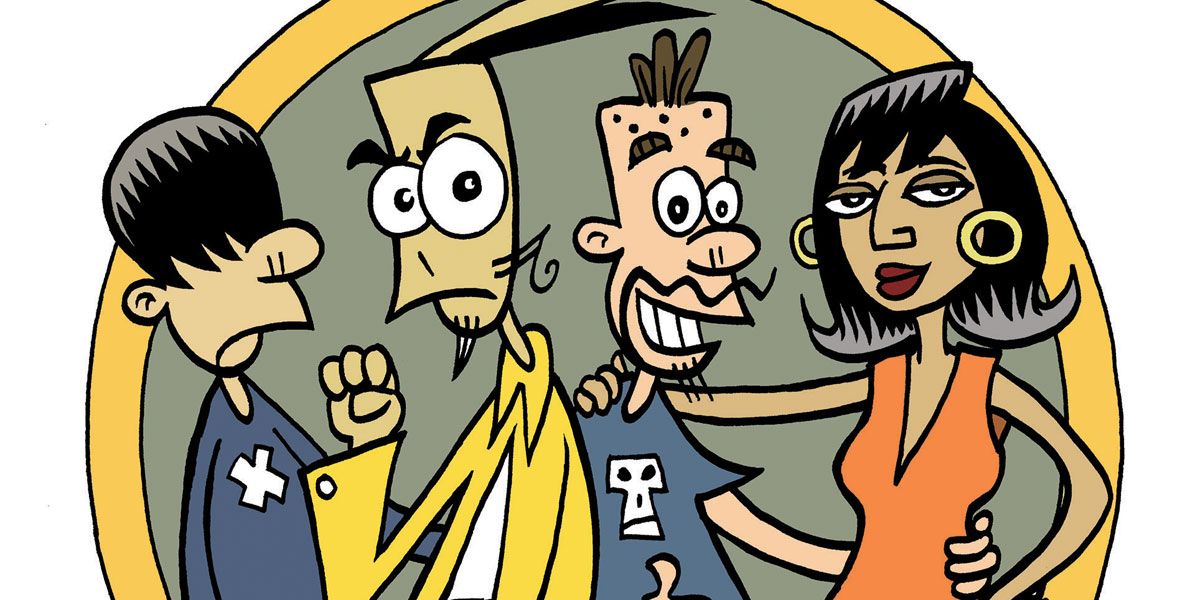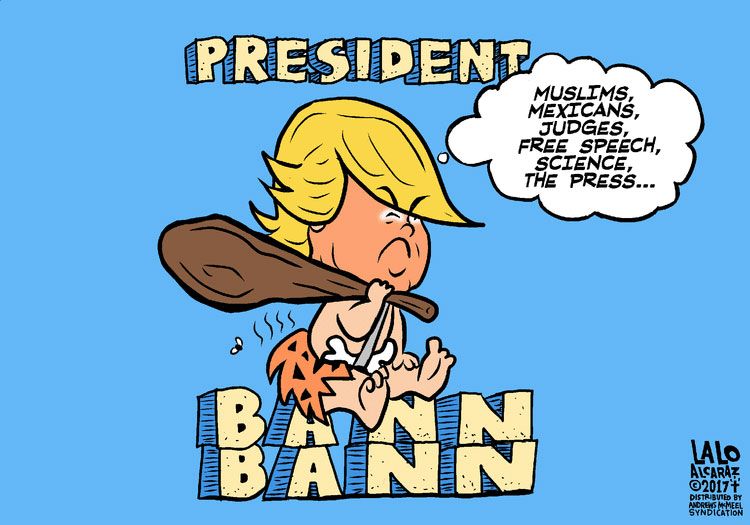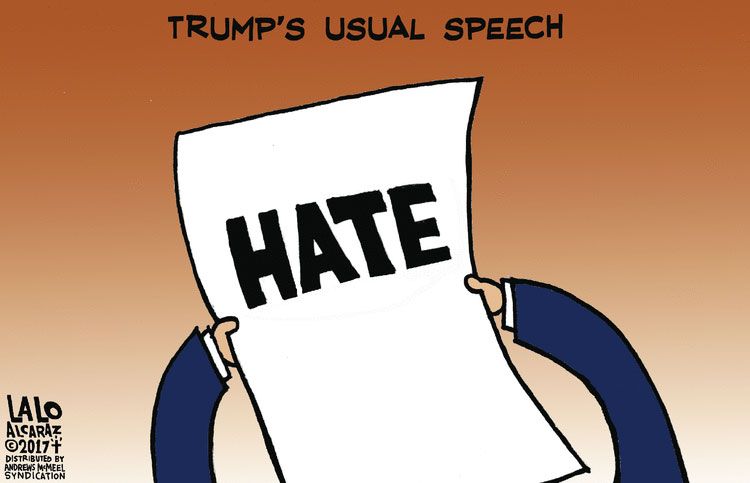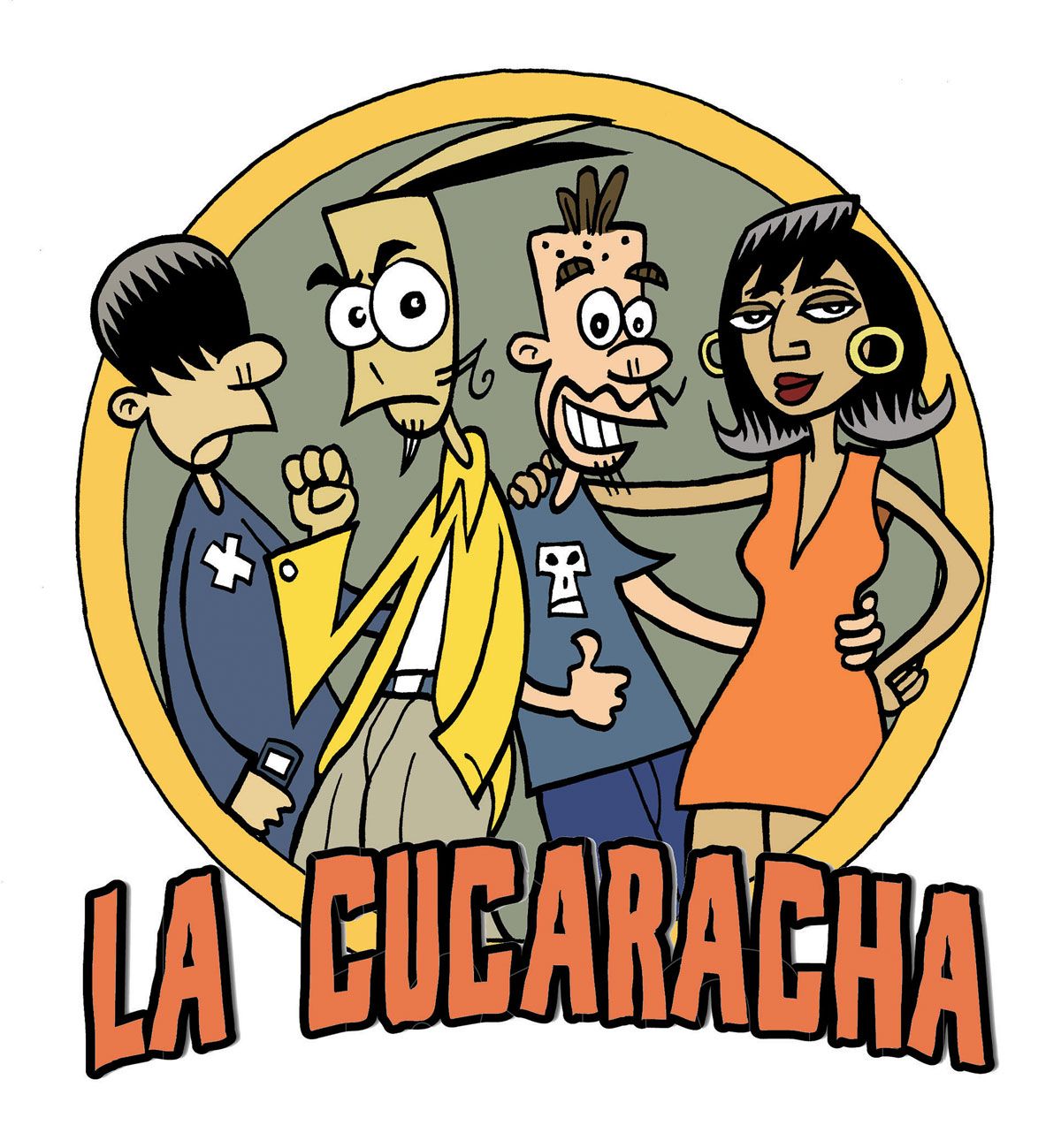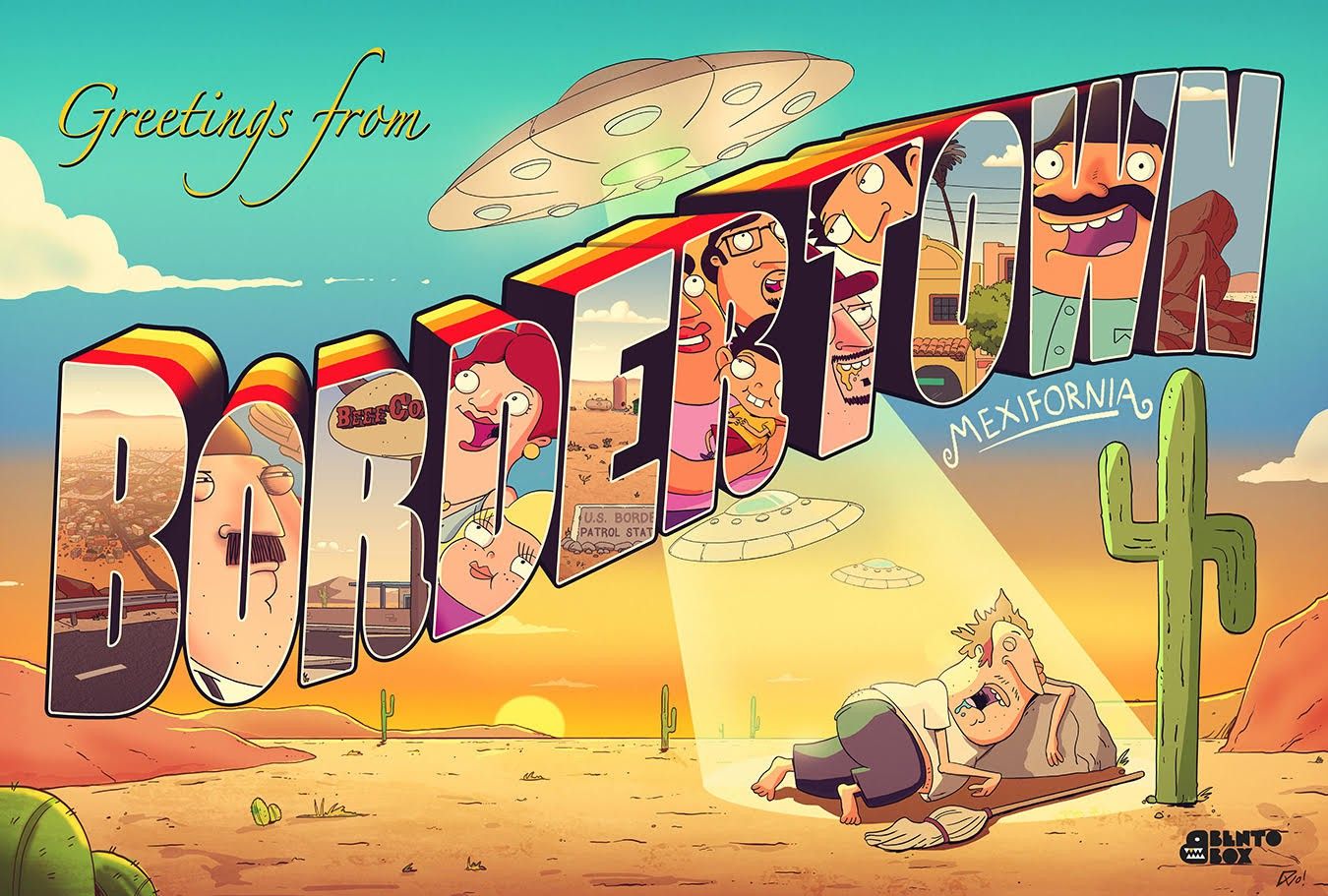Lalo Alcaraz is likely best known for his daily comic strip “La Cucaracha,” the hilarious and topical strip which has been syndicated since 2002. In addition to his daily strip Alcaraz is also an award-winning editorial cartoonist, he co-hosts the "Pocho Hour of Power" on KPFK in Los Angeles, teaches illustration and comics and is the author or co-author of books including “Migra Mouse” and “Latino USA: A Cartoon History.”
He's also branched out to TV and film, as a writer and producer on the short-lived Fox animated series “Bordertown,” and as a consultant on Pixar’s upcoming film "Coco."
Over the course of his career, Alcaraz has been a satirist and an activist. With a new political administration that seems to outpace satirists -- and one that has made an effort to stoke anti-Hispanic sentiment -- CBR sat down with Alcaraz to talk about his work. He spoke about how he started out as an artist, how the current moment reminds him of 1990s California in some ways, and how that helped to prepare him for the present.
CBR: You’re making the daily strip “La Cucaracha,” which can be political, and you’re also an editorial cartoonist. How did you first get into cartooning?
When I was a teenager, I was really angry and pissed off all the time. I grew up in San Diego, which was very conservative, and I didn’t like the way that myself or my immigrant parents were treated. I was born in San Diego and I feel stupid having to reassert that I’m a US citizen, but that’s what’s going on right now. [Laughs] These guys are trying to figure out ways to get rid of everybody -- whether they’re born here or not. I saw the way that my parents were treated, the way I was treated, and it pissed me off.
There was a PSA on TV about mural painting classes at a Chicano art center, so I went there and signed up for the classes. The instructors were Chicano artists and muralists. I learned about Chicano art through them, which is political art and has a strong message. I always loved comics and read comics when I was a kid -- especially “Gordo” by Gus Arriola. Later in high school and college, I read “Doonesbury” and “Bloom County.” That’s how I became aware of political comics. Of course like every editorial cartoonist on the planet, I was the cartoonist for his college paper. [Laughs] That’s where I learned how to do it five times a week. I shared the job with a guy who was not as aggressive as I was so I kind of took it over and did it four, five times a week and learned about deadlines so and rapid response.
Do you think of the editorial cartoonist’s job in a certain way? How do you define what you do?
I think there’s different definitions. Some treat it more like journalism than political art. I don’t see it that way. Be truthful, be fair, but you don’t have to be nice. [Laughs] I have a friend who’s a really awesome and well-known kids' book illustrator. He told me one time, I’m a failed editorial cartoonist and showed me one of his cartoons. I read it and I was like, what is the point of this cartoon? [Laughs] He said, that’s what my editor told me. He didn’t have a point. He was trying to be fair to both sides. That’s not what political cartoons do. They’re supposed to be savage and brutal and have a clear message whatever that message is.
That’s the tradition. To get the point across quickly and easily -- and you didn’t even have to be able to read to understand what it was saying.
I think that as editorial cartoons became part of the establishment of big papers that thought, “let’s be not fair to both sides,” became “let’s attack both sides.” I can live with that. But I don’t always feel the need to attack every side.
Do you ever feel like you’re being too didactic, or preaching to the choir?
I don’t know. I think lately at least half the country has come around to my viewpoint. I’m used to being the minority cartoonist. Come with me to the editorial cartoonist convention -- it’s me and two black guys and two women and the rest are white guys. I’m used to being the minority voice. I used to say before I used to just do cartoons on immigration, on Chicano identity, and racism, and now it’s become the number one topic in the country. I don’t know. I think if I’m preaching to the choir now, it’s after years of shouting in the alley.
You’re talking about same things, but more of us are paying attention.
It’s been uphill, but now we’re all talking about these things.
“La Cucaracha” is a very political comic. Are there ideas which you think are too political and wouldn’t work there? Do you think of the strip as different from your editorial comics in some way?
I don’t know if I’ve been successful in trying to show how the issues affect people. Sometimes I am very preachy and there’s no counterpoint. I admit that. But sometimes instead of showing left vs. right, I’ll show how a little kid is affected by a racist man telling him that his family is going to get deported. Which is happening! I think to show that in a comic strip is pretty unique. I don’t think anyone else in the country is showing how these policies affect Latinos and people of color. Some political strips like “Doonesbury” or “Candorville” might show how people of color are affected. I wish there was a hundred guys doing it, but there’s not. I wish there was a thousand women doing it, too.
Do you worry about normalizing Trump?
I don’t know. I wouldn’t say I’m normalizing him. I would say all those people on CNN toeing around him racism and his sexual assault tendencies are the ones normalizing him. Satirists can only do one thing -- punch a Nazi. If you punch a Nazi in the face, you’re not normalizing him. [Laughs]
That is true, but I know a lot of people have been asking, what do you satirize now?
No kidding! It’s hard when the subject is outpacing you in ridiculous content. It’s a challenge, but we’ll see where this goes. [Laughs]
I keep thinking about California and Pete Wilson and a lot of the fights around immigration and race back in the 1990s. That was a dark political time, and now California is a very different place.
Speaking of weird times that led to some good satire. It was a dark time here. Proposition 187 was the granddaddy of a lot of these Arizona laws and anti-immigrant laws that we fought back and beat back with the Constitution. [Then-California Governor] Pete Wilson used exploitation of immigrants through Prop 187 to win reelection. I literally had stomach aches all the time. Me and my friends were all stressed out about this. It was turning people against each other -- just like now. That’s when we came up with “self-deportation.” We created “Hispanics for Wilson” and created a spoof anti-immigrant group willing to deport themselves to support Pete Wilson. It was based on his group of three Cuban lawyers called Latinos for Wilson, which we all questioned -- and decided to make up our own. We got on television and it made a little bit of history. It led to Pete Wilson using “self-deportation.”
All you can do really is mock and hope you expose the hypocrisy and the sickness behind some of these things. The other day I got this feeling that that was just a warmup. Because it’s really real and national now. All that effort back then was just practice. I was meant to be in my 50s fighting this because this is when my skills are about as good as they’re going to get. I think I’m more prepared to fight it now -- better than I was when I was in my 30s with Pete Wilson.
I don’t want to phrase it as, do you have any advice for those of us who are younger and have not necessarily been through these fights, but do you?
I gave a commencement speech at UC Berkeley -- my college, the architecture school -- about two years ago. My speech was not lackadaisical, but it was meant to be a counter to all the speeches that give you all this advice. My advice was: Let life wash over you. I told them, you’re already smart, you’re already in college, you’re doing the right things. You did all that. I came here, studied architecture, got my masters, but I discovered myself. I discovered that I was meant to be an artist and a satirist. I let life tell me what my path was. I don’t think that’s advice that anybody can sue me over for malpractice. [Laughs]
I don’t think it’s a cop out either. I could have not listened to life. I would be pissed off right now behind a desk somewhere. Sometimes you’ve got to listen to what’s right in front of your face. This is where we’re all at right now. Listen to what is right in front of your face. Take it literally. This is serious. I tell younger people, yeah, you can be crazy now, but things will get serious at some point. You’ll be that much smarter and stronger when you’re older, so it’s a good payoff. Don’t give up hope. Somewhere in there is a message. [Laughs]
It’s hard being funny, but you’re still managing to find humor in things.
Yeah, cause I’m just as demented as the next cartoonist. [Laughs] We can always find something funny. I posted a really funny Andy Borowitz post and some guy was like, this is not funny at all. I thought, what are you missing, man? It was a hilarious piece about how [Acting] Attorney General Sally Yates was fired when Donald Trump found a copy of the Constitution on her computer. That’s funny. [Laughs] We have to do everything to deflate these people. If we’re laughing all the way to the camp, that’s what we’ve got to do.
So you’re writing and drawing “La Cucaracha” seven days a week, you’re drawing editorial cartoons, you have the radio show every week. You’re a consultant on one of the new Pixar movies, “Coco,” which I know you can’t talk about. Is there anything else?
I’m still pitching television. Sadly “Bordertown” was canceled by Fox, but I pitched some new stuff last year with the creator of “Bordertown” and we’re going to be pitching some stuff this spring. Maybe “Bordertown” was just the prelude for something bigger. I’m ever hopeful. Like every waiter in Los Angeles, I’m ever hopeful.
I’m trying to keep on that track, but obviously my main horse is this. I’ve been doing three or four editorial cartoons a week and I’m only contracted to do one a week. I pared it down a few years ago because the strip was a lot and then I was doing other stuff and it was hard to keep up, but stuff is just coming to me. [Laughs] Every day it’s a new thing.
Lalo Alcaraz's editorial cartoons and "La Cucaracha" are available online.

